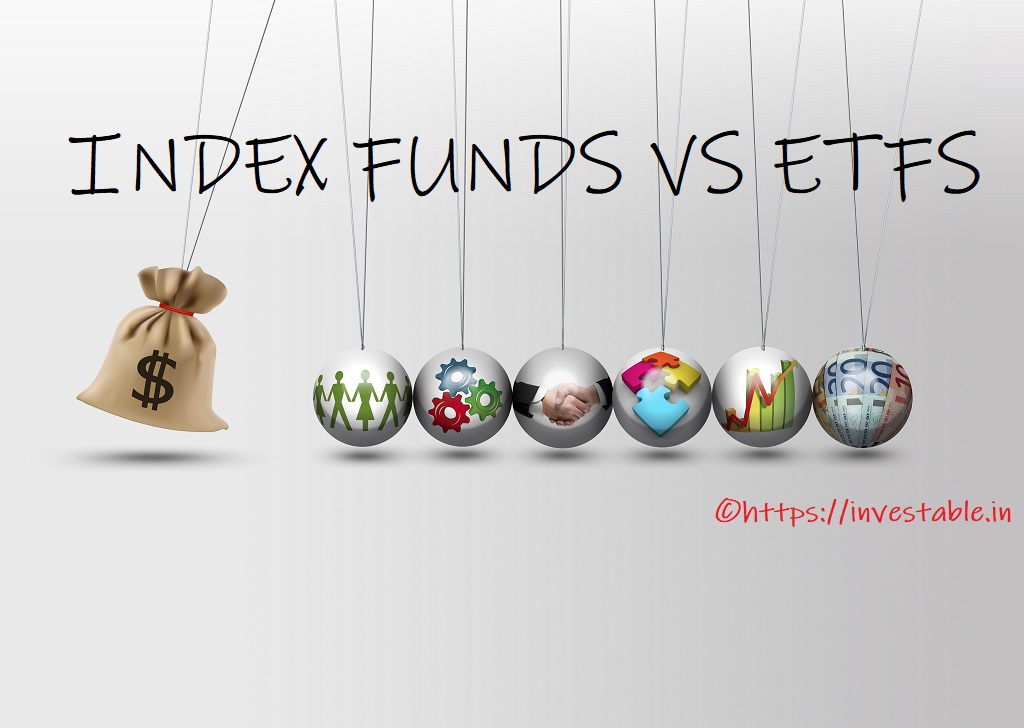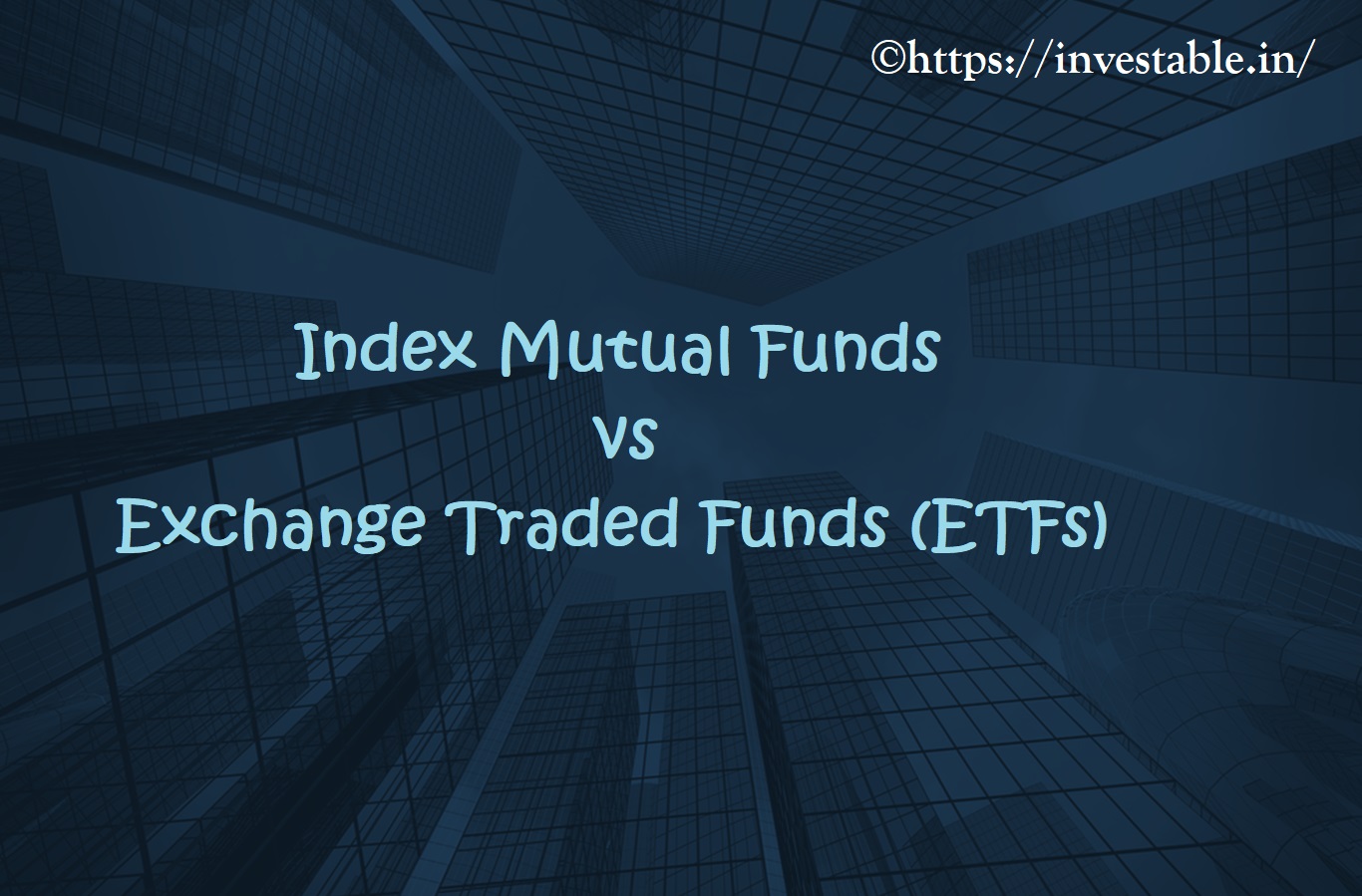In our last article where we talked about BSE Sensex in detail, we mentioned that if we had invested 1 lakh in Sensex 40 years back, then that investment would have become 4 Crore as of now. This is some serious numbers, and we can’t deny that equity is one of the best asset classes available to mankind if we are serious about wealth creation over a long period of time.

But here in India less than 2% of the total population actively invest in the stock market, and most of the people consider it as gambling. I am not denying that the equity market can be quite risky if we start investing in it without proper knowledge, and it can wipe out your entire wealth in a span of few months. But, if we study well, and gather ample amount of knowledge, then it can bring fortune to you for sure.
I am assuming that we are on the same page right now, and we have understood the importance of investing in the equity market by now. There are mainly two ways of taking an exposure to equity markets, the first one is called Active Investment, and the second one is called Passive Investment. Now the point is should we actively invest in the equity market or should we adopt a more passive approach?
Active Investment
“Active Investment” as the name suggest in this type, you stay active in the market to take your own investment decisions, or you pay some amount of money to some Asset Management Companies (AMCs) or Portfolio Management Services (PMCs), to actively make investment decisions on your behalf. So you can either invest in direct stocks like HDFC Bank, Reliance or any other company that is currently listed on BSE/NSE or you can invest in any actively managed funds offered by Mutual Fund companies.
In this type of investment, you need to track your portfolio/mutual funds every now and then to keep your funds secure. In short you must invest your time, effort and money to be able to create sustainable wealth by actively investing directly into the Indian equity market. But what if you don’t want to invest that much of a time, or you don’t want to track your portfolio/funds every now and then? Well, there is a solution for that as well, and that’s called “Passive Investment”.
Passive Investment
If you are willing to take a passive approach to investing in the Indian equity markets, then Passive Investment is the way to go. Though, there are plenty of options you can choose where you can invest in a passive manner, but here we will be focussing only on equities and nothing else.
In Passive Investing approach, we just aim to mirror the index, so it naturally becomes more conservative and low risk investment. In fact more than 90% of people lose money in the stock market because they try to time the market (buying at a low point and selling at a high point) in order to secure higher returns. Even your actively managed funds are not safe, because in order to beat the benchmark index, your fund manager takes risk and that can impact your fund badly in negative scenarios.
So if you consider yourself as a conservative person, and want to take exposure to the equity while maintaining a low risk approach, then Passive Investment may be the best option that you have in your arsenal currently.
There are mainly two instruments which help you take a passive exposure to equities. You can either invest via Index Funds which are being offered by leading mutual fund companies or via exchange traded funds (ETFs) that are actively traded by stock market participants on the exchanges. Now, let’s understand these two popular instruments in greater detail.
Index Fund is like any other normal mutual funds that are offered by asset management companies in India. But in this type of mutual fund scheme the fund manager doesn’t handpick stocks, rather he just make a portfolio with a bucket of stocks that exactly replicates an index (like Sensex or Nifty). The core aim of any index fund is to mirror the exact performance of the index as closely as possible by minimizing the tracking error. In these types of scheme, the fund manager makes some extra effort to ensure that the tracking error is maintained at bare minimum.
What is Tracking Error?
Tracking error is nothing but the divergence between the price behavior of a portfolio and same of a benchmark index. It is often used in the context of Index Mutual Funds or ETFs as a measure of tool to calculate how effectively the fund has managed to replicate the performance of its benchmark index, so that it doesn’t create any unexpected loss or profit.
Tracking error is calculated by taking a standard deviation percentage difference in account, which basically implies the core difference between the return an investor receives and that of the index benchmark they were attempting to mirror.
Index Funds are not actively traded in the exchange, and that’s why these funds don’t have any liquidity of their own. Therefore index fund managers usually maintain a higher percentage of assets in cash and liquid securities than ETFs, and that’s why tracking error occurs. In short, if an index fund is having a higher tracking error, then it means it has failed to achieve its core purpose i.e. to mirror the performance of its actual index.
An Exchange Traded Funds or ETFs are basically securities that we can buy, sell or trade on an exchange like any other individual stocks. ETFs can be bought or sold throughout the trading session unlike the open ended mutual fund schemes that can only be bought and sold at the End of the Day (EOD) NAV. ETFs are generally made up of the securities making a particular index like Nifty or Sensex. In this case, each of the stock would have the same weightage as it actually carries in the index.
Though the functionalities and objectives are same in case of Index Funds and ETFs, but there are few structural and fundamental differences between these two options. Here I would like to request all of to pay special attention, because I will be doing an in-depth Index Funds vs ETFs comparison now in this section.
Whenever an investor purchase index fund from an AMC, then that investment will get added to the Assets Under Management (AUM) of that particular fund house. But, in the case of ETFs, it does not get added to the AUM. In fact if you wanna buy an ETF from the exchange, then someone needs to remain there to sell it. So market liquidity is very essential for any ETFs whatsoever, but the same is not the case for Index Funds.
In most cases, the expense ratio of an index fund is on the higher side than that of an ETF. But as we can trade ETF on the exchanges, we will have to pay statutory charges, Securities Transaction Tax (STT), and brokerage for every trade. So in order to draw a clear picture we need to factor in all these additional charges as well.
If you want to invest in an index fund, then you can do that directly with the AMCs that are offering those funds. Demat accounts are not necessary for index funds, as these funds are not being traded on the exchanges. But, for ETFs, having a demat account is mandatory, otherwise you won’t be able to buy or sell an ETF.
[Note: Demat accounts come with annual maintenance charges. So Index Funds have this edge over ETFs in terms of fees.]
Index Funds are basically like any other mutual funds. Hence, its Net Asset Value (NAV) is determined by the AMC at the end of the trading day, and you can buy/sell it at that price only for that trading session. However, ETF values are live, and you can always check the price on real-time basis before buying or selling. The price of an ETF reflects the index (sensex or nifty) fraction as closely as possible, and thus it provides better flexibility to its investors.
An ETF fund manager does not have to keep funds aside for liquidity, and that’s why an ETF can mirror the index more closely. But, in the case of Index Fund Managers, they have to ensure that they are keeping a certain percentage of the total funds aside in cash or liquid options to ensure liquidity for redemption to buyers and sellers. Hence, an Index Fund is generally less effective in tracking an index. In short, the average tracking error of the index funds are higher than the same of ETFs.
Systematic Investment Plans (SIPs) are one of the best investment tools to create wealth in the longer time frame especially for the retail investors like you and me. If you start a SIP, then a certain amount got debited from our account every month, so it helps us to adopt a disciplined approach when it comes to investing. It also provides the additional benefits of rupee-cost-averaging which basically lowers our average cost of investment. All the index funds allows the benefits of SIPs, but for Index ETFs, the benefits of SIPs are not readily available due to its close-ended nature and type. So if you consider yourself a know-nothing investor, then systematic investment via ETFs can become challenging from the perspective of long term financial planning.
All the ETFs disclose their total holdings on a daily basis, but index funds disclose their total holdings on a periodic basis (mostly monthly).
If you own units of an ETF, then your dividends for that ETF will be credited to your registered bank account. But, in the case of the index funds, either you can choose a dividend reinvestment plan (managed by the AMCs) or a growth plan. If you choose the dividend reinvestment plan, all of your dividends will directly get substituted by units. On the other hand if you own an ETF, then you will have to do the reinvest thing manually.
If you plan to withdraw your units from your existing ETF funds within 1 year of your investment, then you will have to pay 15% tax as Short Term Capital Gain (STCG). Earlier there was zero LTCG tax on ETF investments, but now we will have to pay LTCG tax of 10% for ETFs for 1lakh+ returns on a financial year.
And, in the case of index mutual funds your returns are taxed as 15% if you redeem before one year, and after 1 year, you are bound to pay Long Term Capital Gain (LTCG) tax of 10%, if your gains are more than 1lakh in a financial year.
Conclusion
Finally to conclude I would say that if you are know-nothing investor, then you should go for index fund, as you don’t need a demat account for that. One more advantage in index mutual fund is that you can invest via SIP mode, so you can stay invested in a disciplined manner for a longer time frame.
However, if you are already having a demat account, or you are planning to actively invest in direct stocks as well, then you may consider ETFs as well, as it offers lower expense ratio, tax benefits, lower tracking error and other benefits.
